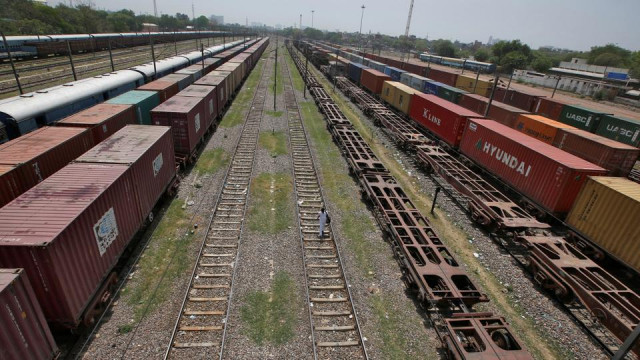Pakistan to seek $2.7b Chinese loan
Funding is for construction of phase-I of ML-1 railway project under CPEC

Pakistan on Friday decided to seek $2.7 billion in loan from China for the construction of package-I of the Mainline-1 project of China Pakistan Economic Corridor (CPEC) amid the Ministry of Finance’s emphasis on making the project bankable to address debt sustainability concerns.
The sixth meeting of the financing committee on ML-1 project decided that Pakistan would initially request China to sanction only $2.73 billion in loan out of the total estimated Chinese financing of about $6.1 billion, according to government officials.
The Ministry of Economic Affairs has been directed to formally send the Letter of Intent to China next week as Beijing is expected to finalise its next year’s financing plans by the end of current month, according to the officials. Planning Commission Deputy Chairman Dr Jehanzeb Khan chaired the sixth meeting of the financing committee.
The Ministry of Railways was in favour of making the request for full financing of $6.1 billion but due to overall debt sustainability concerns it was decided that Pakistan would get the loan in three tranches, subject to Chinese endorsement of the plan, said the sources.
In August this year, the Executive Committee of National Economic Council (Ecnec) approved the strategically important ML-1 project worth $6.8 billion. Pakistan seeks 90% Chinese loan for the project, which Beijing has not yet formally endorsed.
Initially, it was decided that Pakistan would undertake only $2.4 billion worth of construction work under package-I due to “Pakistan’s commitments to the IMF programme”, according to official documents. But later the civil work scope was expanded to $2.73 billion after the railways minister brought some changes to the construction plan.
The package-1 will be implemented from January 2021 to December 2024 and will cover the construction of a 527km track between Peshawar, Rawalpindi and Lahore. Sources said that it seemed that work on the ground may not begin by January due to delay in finalisation of loan modalities and selection of contractors.
The ML-1 project includes dualisation and upgrading of the 1,872km railway track from Peshawar to Karachi and is a major milestone for the second phase of CPEC. During Friday’s meeting, a Ministry of Finance representative raised the issue of bankability of the project, said the sources. The ministry has long been expressing concern that the huge cost of $6.8 billion will have implications for the balance sheet of Pakistan Railways and the Ministry of Finance.
The finance ministry representative sought details of the payback period and asked about the means of returning the Chinese loan, said the sources. However, there was hope that after approval of the project by Ecnec, headed by Finance Adviser Dr Abdul Hafeez Shaikh, the ministry would not raise those concerns.
“It is the responsibility of the Ministry of Finance to ensure continued and improved debt sustainability and advice of the Ministry of Finance on bankability (of the project) has been given in this context,” said Kamran Afzal, spokesman for the Ministry of Finance. “The advice given by the Ministry of Finance will improve project feasibility,” he added.
To a question, the spokesman said that the IMF had not conveyed any concern to Pakistan over the ML-1 project. The Planning Commission deputy chairman also directed the Ministry of Railways to give a briefing to the Ministry of Finance and the Ministry of Economic Affairs about the payback period and bankability of the project, the sources said. Ecnec had also decided that around $6.2 billion worth of Chinese loan would be booked both on books of the federal government and Pakistan Railways due to the weak financial condition of the state-owned enterprise.
Pakistan Railways is not in a position to pay salaries and pensions to its employees without cash injection from the federal government. According to the ML-1 framework agreement, the project will be executed in the engineering, procurement and construction mode by Chinese contractors. Under the CPEC framework, ML-1 is the only strategic project being finalised as part of the initial $46 billion deal.
However, the project faces significant delays and both the Pakistan Muslim League-Nawaz (PML-N) and Pakistan Tehreek-e-Insaf (PTI) governments could not meet the originally agreed deadlines. Sources said in April this year Pakistan had shared a term sheet for Chinese loan, seeking 1% interest rate. But China has not yet formally responded to the request. They said that informally Chinese authorities conveyed that the interest rate could be higher than the one mentioned in the term sheet.



















COMMENTS
Comments are moderated and generally will be posted if they are on-topic and not abusive.
For more information, please see our Comments FAQ